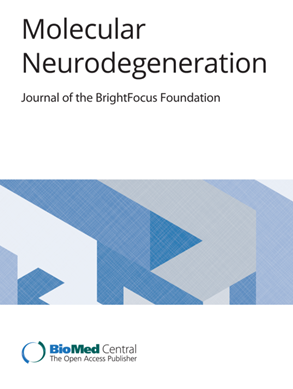Whole-genome sequencing analysis reveals new susceptibility loci and structural variants associated with progressive supranuclear palsy
IF 14.9
1区 医学
Q1 NEUROSCIENCES
引用次数: 0
Abstract
Progressive supranuclear palsy (PSP) is a rare neurodegenerative disease characterized by the accumulation of aggregated tau proteins in astrocytes, neurons, and oligodendrocytes. Previous genome-wide association studies for PSP were based on genotype array, therefore, were inadequate for the analysis of rare variants as well as larger mutations, such as small insertions/deletions (indels) and structural variants (SVs). In this study, we performed whole genome sequencing (WGS) and conducted association analysis for single nucleotide variants (SNVs), indels, and SVs, in a cohort of 1,718 cases and 2,944 controls of European ancestry. Of the 1,718 PSP individuals, 1,441 were autopsy-confirmed and 277 were clinically diagnosed. Our analysis of common SNVs and indels confirmed known genetic loci at MAPT, MOBP, STX6, SLCO1A2, DUSP10, and SP1, and further uncovered novel signals in APOE, FCHO1/MAP1S, KIF13A, TRIM24, TNXB, and ELOVL1. Notably, in contrast to Alzheimer’s disease (AD), we observed the APOE ε2 allele to be the risk allele in PSP. Analysis of rare SNVs and indels identified significant association in ZNF592 and further gene network analysis identified a module of neuronal genes dysregulated in PSP. Moreover, seven common SVs associated with PSP were observed in the H1/H2 haplotype region (17q21.31) and other loci, including IGH, PCMT1, CYP2A13, and SMCP. In the H1/H2 haplotype region, there is a burden of rare deletions and duplications (P = 6.73 × 10–3) in PSP. Through WGS, we significantly enhanced our understanding of the genetic basis of PSP, providing new targets for exploring disease mechanisms and therapeutic interventions.全基因组测序分析揭示了与进行性核上性麻痹相关的新易感基因位点和结构变异体
进行性核上性麻痹(PSP)是一种罕见的神经退行性疾病,其特征是在星形胶质细胞、神经元和少突胶质细胞中积累聚集的 tau 蛋白。以往针对 PSP 的全基因组关联研究基于基因型阵列,因此不足以分析罕见变异以及较大的突变,如小插入/缺失(indels)和结构变异(SVs)。在这项研究中,我们对欧洲血统的 1,718 例病例和 2,944 例对照进行了全基因组测序 (WGS),并对单核苷酸变异 (SNV)、嵌合体和 SVs 进行了关联分析。在 1718 例 PSP 患者中,1441 例经尸检确诊,277 例经临床诊断。我们对常见 SNV 和嵌合体的分析证实了 MAPT、MOBP、STX6、SLCO1A2、DUSP10 和 SP1 的已知遗传位点,并进一步发现了 APOE、FCHO1/MAP1S、KIF13A、TRIM24、TNXB 和 ELOVL1 的新信号。值得注意的是,与阿尔茨海默病(AD)相反,我们观察到 APOE ε2等位基因是 PSP 的风险等位基因。对罕见SNVs和indels的分析发现了ZNF592的显著相关性,进一步的基因网络分析发现了一个在PSP中失调的神经元基因模块。此外,在H1/H2单倍型区域(17q21.31)和其他位点(包括IGH、PCMT1、CYP2A13和SMCP)观察到7个与PSP相关的常见SV。在 H1/H2 单倍型区域,PSP 存在大量罕见的缺失和重复(P = 6.73 × 10-3)。通过 WGS,我们大大加深了对 PSP 遗传基础的了解,为探索疾病机制和治疗干预提供了新的靶点。
本文章由计算机程序翻译,如有差异,请以英文原文为准。
求助全文
约1分钟内获得全文
求助全文
来源期刊

Molecular Neurodegeneration
医学-神经科学
CiteScore
23.00
自引率
4.60%
发文量
78
审稿时长
6-12 weeks
期刊介绍:
Molecular Neurodegeneration, an open-access, peer-reviewed journal, comprehensively covers neurodegeneration research at the molecular and cellular levels.
Neurodegenerative diseases, such as Alzheimer's, Parkinson's, Huntington's, and prion diseases, fall under its purview. These disorders, often linked to advanced aging and characterized by varying degrees of dementia, pose a significant public health concern with the growing aging population. Recent strides in understanding the molecular and cellular mechanisms of these neurodegenerative disorders offer valuable insights into their pathogenesis.
 求助内容:
求助内容: 应助结果提醒方式:
应助结果提醒方式:


